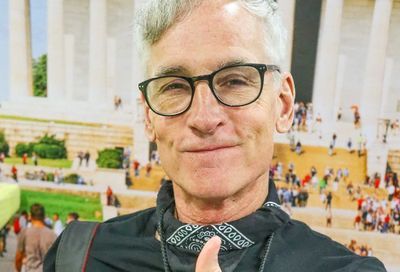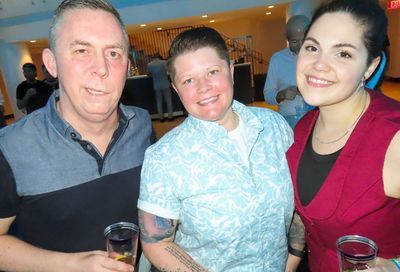Forum: Moonlight’s Historic Win
How did people feel about Moonlight's historic win?
By Randy Shulman on March 2, 2017 @RandyShulman

Welcome to Forum, Metro Weekly’s newest section. It’s a place for curated conversations and ideas, a place to discuss — seriously and, perhaps at times, humorously — LGBTQ issues vital to our times (or to look at any current topic from an LGBTQ perpective). Some weeks it will be a collection of voices, other weeks, one or two selected opinions. As the section evolves, both in print and online, we’ll be adding new components.
Feel free to weigh in at metroweekly.com/forum and potentially add your own voice to our pages.
For our debut, we thought it fitting to ask people how they felt about Sunday night’s Best Picture win for Moonlight — as well as the unfortunate envelope mishap surrounding it.
We’ll kick things off by saying we couldn’t be more overjoyed that Hollywood finally did the right thing and truly rewarded a motion picture worthy of the best picture title — albeit in a way that ultimately stripped an historic moment for both the African-American and LGBTQ community of some of its glory. Still, no film in recent Oscar history was more deserving of the top nod than Moonlight, a poetic, ethereal, emotionally resonant film about coming to terms with yourself, your love, and your life. — Randy Shulman, Editor-in-Chief
Aisha Moodie-Mills, President and CEO, Gay and Lesbian Victory Fund and Institute: Last night’s Oscar wins for Moonlight were incredible. To watch history made with a black film focused on the LGBTQ community was phenomenal. Our current political climate has placed targets on our community and others that are outside of the white, cis-gendered, straight, Christian demographic, so to see a film with representation of the beauty and love within our community was inspiring. As both [director] Barry Jenkins and [playwright] Tarell Alvin McCraney mentioned in their acceptance speech for Best Adapted Screenplay, this film matters to the young black and brown boys and girls and gender non-conforming kids, as well as adults, to see their lives reflected back — not as a news story or as a statistic, but as love.
Clarence Fluker: I was extremely happy and proud to see Moonlight receive the Oscar for best picture. Never before had I seen a film explore the vulnerability and strength of a black boy’s journey into manhood in such a way. Every Chiron out there knew that the world sees them. There is something so powerful and empowering in knowing that you are acknowledged, that someone sees and embraces you.
June Crenshaw, Executive Director, Wanda Alston Foundation: I knew this film was magical the first time I saw it. It was simplistically complicated and skillfully, artfully intertwined sexuality and masculinity. Moonlight aptly depicts the challenges of poverty in the black community, experienced in every city, including affluent Washington, D.C. More importantly, Moonlight brilliantly showed unanticipated examples of amazingly gentle giants in our community that helps to raise our kids and support our lives — examples we rarely see in the movies.
Rea Carey, Executive Director, National LGBTQ Task Force: I was thrilled to see Moonlight win for Best Picture, particularly in this time of attacks on people of color, in this week of attacks on trans kids and the LGBTQ community by the President.
Zar, Project Manager, Team Rayceen: The win feels overdue and revolutionary at the same time. Maybe now more films will be made to which I can relate and which represent my community.
Rev. Akousa (Abena) McCray-Peters, Founding Pastor, Unity Fellowship Church: Is is my hope that this win will open the eyes, hearts and minds of those who struggle with their sexuality, in addition to those who speak out of against those who identify as same-gender-attraction.
Danielle Moodie-Mills, Vice President, SKDKnickerbocker: It was honestly one of the best feelings I’ve had since the election. To see this beautiful story of black love and LGBTQ acceptance win the biggest prize of the night was magnificent. Our stories and our voices matter and are largely erased from the greater American narrative. This prize did a lot to signal to the industry that people want to see diverse stories, and that they want to connect with them and celebrate them.
Earl Fowlkes, President/CEO, Center For Black Equality: I was disappointed when I saw that Moonlight did not win at first. I was watching the Oscars at a bar and didn’t realize that in fact Moonlight won Best Picture until I got home. I was so very happy to see this film win Best Picture.
Carey: With the wrong envelope being handed to the presenters, causing the cast, director, and producers of Moonlight having to wait for their deserved moment in the spotlight, the mirroring of racial dynamics in society, was stark, painful and more than ironic.
Kimberley Bush, Director of Arts and Cultural Programs, The DC Center: What happened was completely unacceptable. And it truly shows how even Hollywood’s seasoned actors didn’t have any faith or belief that a film created by POC’s about LGBTQ POC could possible take such an honor. Moonlight‘s limelight was stolen and that crucial moment in history can not be regained. You can’t do a second take. You can’t rewind. Barry and Tarell’s prideful, celebratory and momentous life experience was soiled. They were cheated.
Rev. McCray-Peters: The gaffe, was just what it is: “a mistake made in a social situation.” We see that happening almost daily under our current administration. It was simply a social blunder and doesn’t in any way change the actual winning.
Cathy Renna, Principal, Target Cue: My heart sank when La La Land was announced as the winner, and then suddenly found myself jumping with joy. Frankly, I think the snafu will help – the media has covered the gaffe so much that the film is getting a lot more attention than it would have otherwise.
Danielle Moodie-Mills: We need to move past the mishap and instead focus on the brilliance of this film and why it’s more important than ever for your young black and brown queer kids and gender non-conforming youth to see themselves when their government is turning its back on them.
Jose Carrasquillo, Associate Artist, Theater J, GALA Hispanic Theatre: I was personally rooting for Moonlight. It was a profound and affecting piece of art, but it is not historically the kind of film that the Academy rewards. Look no further than Brokeback Mountain. I thought, “Only a true miracle can make this happen.” And then to my astonishment, that miracle happened.
Sultan Shakir, Executive Director, SMYAL: I think the gaffe sits next to the accomplishment but doesn’t overshadow it. It’s a part of the story of the win, but not above the win. Moonlight won the Oscar for Best Picture. That will always be an important historical fact. Period.
Serge Seiden, Managing Director and Producer, Mosaic Theater Company: To see it lose and then to win was an emotional roller coaster. The tone of the culture is shifting, progressing. Years of people of color demanding accurate representation and different stories to be told and this felt like a response, an answer, to those demands.
Rayceen Pendarvis, Host, The Ask Rayceen Show: Hopefully this will greenlight more diverse stories to highlight the different experiences within the LGBTQ community. But we should continue to make art for the sake of artistic expression, not just as a means to gain mainstream recognition.
Ron Simmons, Retired President/CEO, Us Helping Us: The idea that this is a watershed moment will be tested next year when we see how diversified the Oscars are. Since films are expensive and hard to make, there may not be any good ones in next year’s crop of awardees. We need to begin a structural change in Hollywood, putting colored faces behind the set as technicians, writers, directors and producers if the Academy Awards are to be fully diversified.
Aisha Moody-Mills: Last night’s Oscar’s looked like America. It’s not just about diversity for diversity’s sake. These films and actors of color that won last night didn’t win because we needed diversity — they won because their talent is beyond exceptional and the stories they are elevating need to a part of the fabric of the American story.
Danielle Moody-Mills: The breadth and depth of stories and lives that were celebrated at this year’s Oscars signaled progress for an industry that has long worked to elevate lived experiences of White America while denying the multi-dimensional lives of people of color and specifically queer people of color. We are as beautiful and as diverse as the rainbow we represent. There are so many stories that have gone untold. Maybe now, thanks to Moonlight‘s win they too will have a shot to shine.
Zar: I look forward to the day when all types of people are represented without it being a conscious effort. But I think we can all agree on one thing: The Oscars broadcast is way too long!
[polldaddy poll=9675841]
Have your voice heard! Be a part of Metro Weekly’s Forum. Visit metroweekly.com/forum for details on how to participate!
“LGBTQ,” “Black,” “Women” on Trump’s List of Banned Words
U.S. federal agencies have reportedly flagged over 100 words that may violate Trump's anti-DEI executive order.
By John Riley on March 12, 2025 @JRileyMW
Federal agencies under the Trump administration have flagged hundreds of words to avoid in official government memos, public-facing websites, and informational materials.
Government agencies are seeking to comply with a President Trump executive order seeking to rid the government of diversity, equity and inclusion (DEI) practices, and any programs or initiatives that conservatives decry as "woke," including those that focus on racial and cultural identity, LGBTQ identity, and the idea of "equity" rather than equality.
The list appeared in government memos and agency guidance, ordering the removal of the words from government websites, internal communications, and from written or printed materials.
Bruce Vilanch On His Biggest Flops, Awards Shows, and Bette
Hollywood legend Bruce Vilanch dishes on his misses in his hilarious new book, "It Seemed Like a Bad Idea at the Time"
By André Hereford on March 12, 2025 @here4andre
Bruce Vilanch, the famously bespectacled writer, actor, comedian, songwriter, and erstwhile Hollywood Square, has long been the sassy pen behind some of your favorite funny people's funniest jokes. But, on this late-winter afternoon, he and I settled in for a cozy video chat about the times the funny flopped.
In his insightful, hysterical new book, It Seemed Like a Bad Idea at the Time: The Worst TV Shows in History and Other Things I Wrote, the two-time Emmy-winner pulls back the curtain on a litany of infamous misfires he had a hand in, like The Star Wars Holiday Special.
Support Metro Weekly’s Journalism
These are challenging times for news organizations. And yet it’s crucial we stay active and provide vital resources and information to both our local readers and the world. So won’t you please take a moment and consider supporting Metro Weekly with a membership? For as little as $5 a month, you can help ensure Metro Weekly magazine and MetroWeekly.com remain free, viable resources as we provide the best, most diverse, culturally-resonant LGBTQ coverage in both the D.C. region and around the world. Memberships come with exclusive perks and discounts, your own personal digital delivery of each week’s magazine (and an archive), access to our Member's Lounge when it launches this fall, and exclusive members-only items like Metro Weekly Membership Mugs and Tote Bags! Check out all our membership levels here and please join us today!
The Magazine
-
Most Popular
 Signature Honors Mandy Patinkin in Emotional Celebration
Signature Honors Mandy Patinkin in Emotional Celebration  Gay Army Reserve Officer in Uniform Sex Video Scandal
Gay Army Reserve Officer in Uniform Sex Video Scandal  A Potent (and Pricey) 'Good Night, And Good Luck'
A Potent (and Pricey) 'Good Night, And Good Luck'  MISTR's Free DoxyPEP Leads to Huge Drop in STI Rates
MISTR's Free DoxyPEP Leads to Huge Drop in STI Rates  'Gray Pride' Protests Hungary's Ban on Gay Pride Marches
'Gray Pride' Protests Hungary's Ban on Gay Pride Marches  Becca Balint: The Pride of Vermont
Becca Balint: The Pride of Vermont  Police Barge into Walmart Restroom to Confront Butch Lesbian
Police Barge into Walmart Restroom to Confront Butch Lesbian  Jared Polis Signs Law Repealing Colorado's Gay Marriage Ban
Jared Polis Signs Law Repealing Colorado's Gay Marriage Ban  Sarah Snook is Astonishing in Broadway's 'Dorian Gray'
Sarah Snook is Astonishing in Broadway's 'Dorian Gray'  Sniffies CMO Eli Martin On Cruising Into the App Store
Sniffies CMO Eli Martin On Cruising Into the App Store
 Becca Balint: The Pride of Vermont
Becca Balint: The Pride of Vermont  Signature Honors Mandy Patinkin in Emotional Celebration
Signature Honors Mandy Patinkin in Emotional Celebration  MISTR's Free DoxyPEP Leads to Huge Drop in STI Rates
MISTR's Free DoxyPEP Leads to Huge Drop in STI Rates  A Potent (and Pricey) 'Good Night, And Good Luck'
A Potent (and Pricey) 'Good Night, And Good Luck'  Sarah Snook is Astonishing in Broadway's 'Dorian Gray'
Sarah Snook is Astonishing in Broadway's 'Dorian Gray'  'Gray Pride' Protests Hungary's Ban on Gay Pride Marches
'Gray Pride' Protests Hungary's Ban on Gay Pride Marches  Jared Polis Signs Law Repealing Colorado's Gay Marriage Ban
Jared Polis Signs Law Repealing Colorado's Gay Marriage Ban  White House Ignores Reporters with Pronouns in Email Signatures
White House Ignores Reporters with Pronouns in Email Signatures  White House Demands NIH Study Transgender Transition "Regret"
White House Demands NIH Study Transgender Transition "Regret"  Air Force Reverses Ban on Pronouns in Email Signatures
Air Force Reverses Ban on Pronouns in Email Signatures
Scene
Metro Weekly
Washington's LGBTQ Magazine
P.O. Box 11559
Washington, DC 20008 (202) 638-6830
About Us pageFollow Us:
· Facebook
· Twitter
· Flipboard
· YouTube
· Instagram
· RSS News | RSS SceneArchives
Copyright ©2024 Jansi LLC.










You must be logged in to post a comment.